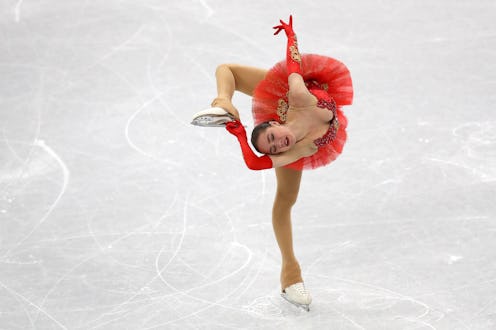Life
There's A Specific Coach To Help Olympians Stay Focused Before Competing — Here's What They Do

If you've ever wondered how Olympic athletes are able to perform flawlessly under extreme pressure, it's because they have a secret weapon — a mental skills coach. These professionals help elite athletes psychologically prepare for major events like the Winter Olympics, to help them train their minds and bodies to work together to achieve seemingly impossible feats. "The physical differences between athletes or teams at the elite level are almost negligible," Colleen Hacker, Ph.D., the mental skills coach for the U.S. Women's Hockey Team, told SELF. "What separates out the good from the great and the great from the greatest is often that psychological component."
Personally, I've always been amazed at how Olympic athletes are able to tune out what's going on around them and execute breathtaking maneuvers amid myriad distractions. Like that time gymnast Kerri Strug vaulted on a broken ankle and landed perfectly to secure the U.S. gold medal during the 1996 Summer Olympic in Atlanta (if you haven't seen it, it's worth watching). While mental skills coaches have been getting a lot of attention lately, they're been quietly working behind the scenes for years training executives, athletes, and performers.
Speaker, executive coach, and emotional intelligence teacher Amy Sandler, who was featured in Bustle in 2017 as one of 10 females startups to watch, co-founded Inspiration at Work to help executives train their brains to excel mindfully under pressure. "Just like an athletic coach trains your body for competition, I teach attention training and meditation to high-level executives to help them better perform under pressure," Sander tells Bustle. It's kind of like going to the gym, but for your brain. And Olympic mental skills coaches do the same thing for athletes.
Hacker told SELF that she uses evidence-based skills and strategies to help everyone from executives to professional athletes and sports teams achieve optimal performance in whatever they do. "Some of the big things I work with them on are calming down or gearing up before a big event, performing on demand, facilitating productive and purposeful self-talk, and building mental toughness."
"Mental skills coaching for athletes addresses the mental game of sport," Mental Skills Coach Lynda Laham explained on her website. "It teaches athletes psychological skills they can use to better adhere to their exercise programs, and perform well in both training and competition, even (and especially) under adverse conditions."
It's not just Olympians who can benefit from this, either. One example of this is George Mumford, author of The Mindful Athlete, who currently works with the New York Knicks, and has taught mindfulness techniques to NBA basketball champions such as Michael Jordan and Kobe Bryant, according to his website. "George helped me understand the art of mindfulness," former Los Angeles Lakers basketball player Kobe Bryant is quoted as saying on Mumford's website. "To be neither distracted or focused, rigid or flexible, passive or aggressive. I learned just to be.”
If you think about it, this makes a whole lot of sense. I have major anticipatory anxiety, which means the longer I have to wait to do something that makes me nervous, the more time I have to doubt myself and psych myself out. Changing the way competitors think about anxiety is one of the main things a mental skills coach helps athletes achieve.
"Being anxious and nervous just means you care," Hacker told SELF. "You need to reframe anxiety as normal, then gain control by focusing on the present. One way to do that is by focusing on your breathing." And, brain training isn't just for athletes and executives. Everyone can benefit from brain training, especially mindfulness, which is the ability to stay present in the moment. "It is the single most important mental skill an athlete can develop," Laham noted.
When I meditate regularly, I notice a huge drop in my anxiety and negative self talk. One of the reasons mindfulness meditation works so well to combat anxiety, according to Laham, is because it helps you focus on the present instead of the past or the future. And, being present in the moment is key to the success of elite athletes. Hacker noted that 30 percent of our thoughts are focused on the past, 60 percent are focused on the future, and only 10 percent are grounded in the present.
"If you're constantly thinking about something other than where you are and what you're doing, your performance will suffer, whether that's at work, at home, or in the gym," Hacker told SELF. "Having that self-awareness is the first step." So while a lot of people still dismiss meditation as new age mumbo jumbo, the world's top performers are quietly using it to win championships, Olympic gold medals, and balance their lives.